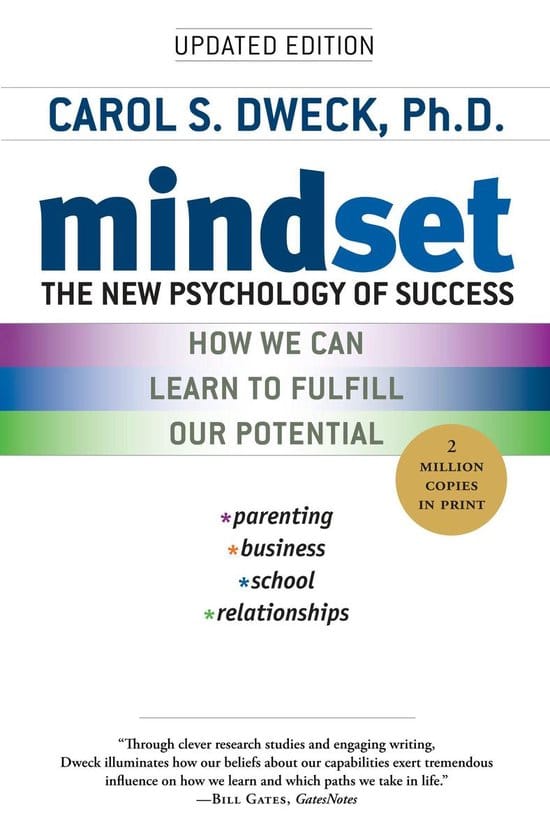A professor of Psychology at Stanford, Carol Dweck writes books that often make you see things from a larger perspective.
In her much loved and appreciated book ‘Mindset’, focusing on Decision Theory and General Systems Theory of Psychology, she talks about the importance of a growth mindset, how it can influence human behavior, and shows that behavior can also be changed over the time.
Introduction: Fixed v/s Growth Mindset
Now what really is a Mindset? It is a way of thinking, a way of perceiving a situation and basically the thought behind our actions.
A person with a fixed mindset believes that a person’s qualities cannot be changed and are solely based on natural talent.
It’s like saying, “Dancing is just not my thing’’ But the real problem is that maybe you were just not trained enough for it.
On other the other hand, a growth mindset believes that with your hard work and efforts, you can attain new qualities and skills.
’Be the change you wish to see in the world.’ – Mahatama Gandhi
It is best to correct ourselves first and work on our growth before we expect this from everyone around us.
More than intelligence and one’s abilities, one needs to be focused and willing to do the work and have the determination to not give up. A growth mindset can help us to achieve not only our professional goals but also meet our personal goals and ambitions.
Failures are bound to happen at every stage of life. Growth Mindset is about how we can embrace resilience and learn from our hardships and live life to the fullest. It is actually the best friend you can have, it teaches you to face the unexpected, and to adjust in a dynamic work environment.
This book very practically gives us 3 important life lessons:
1. How A Fixed Mindset Holds Us Back?

As kids, we are always curious about everything around us and have so many questions to ask but that fades away as we grow up. A major reason for it is that we start forming our opinions and notions about various things – what do we like, what do we don’t like, etc.
Our family backgrounds and experiences in life also shape the way we think. A person with a fixed mindset believes that his/her capabilities are fixed and can even be changed. Such people restrict themselves to a few areas of interest and refrain from trying new things.
This makes us dependent on others for some of the simplest things, be it just making a work presentation or cooking a meal at home.
The author says that some typical mindsets that you might have observed around you are:
- People often assuming either they are good at something or not, with no middle path.
- People assuming it’s too late to learn.
- People assuming there’s no point of trying if I’m going to fail
It’s never too late to learn. We can always take out time, say on the weekends to learn something new or go back to something we had learned in college or school. It’s our ego that really stop us from doing that.
2. The Growth Mindset Can Help Us Overcome Challenges & Achieve Our Biggest Goals
If our mindset is too rigid, we seek approval and acknowledgment from others at every point in our life to gain confidence in our abilities. With an open, growth mindset we will be able to move ahead. We will also listen to our gut feeling and consciousness which will guide us in the right direction.
We can channel all our positive energy simply by having a good frame of mind and using this growth mindset to make us stand strong amidst all the challenges that we may come across. The person with a positive and forward-looking mindset could be the last one standing.
Having such an approach in life would also make sure you sustain your growth and don’t get exhausted in your mid 30’s when you have a whole life ahead of you. If at the age of 80 years, people could summit Everest, then nothing is impossible.
At times, it’s all about taking a leap of faith and looking at the situation as ‘glass half empty or half full.’
3. How Can We Develop A Growth Mindset?
Our mindset is largely affected by who we look up to – our parents, our peers, and our role models. We aim to be like them one day and tend to shape our mindset like how they think.
The book highlights the very important fact that every mindset has the capacity to change and become more of a growth-oriented one. It is also possible to change someone else’s mindset and encourage them more towards having a growth mindset by encouraging and motivating them.
A good practice to imbibe a growth mindset is to meditate, sit, and think of your whole day and ponder on if you could have done something differently. You can also keep a small journal, listing the things that are not going your way and what can you do better.
This books shows that Mindset defines how great parents, teachers, managers, and athletes can put this idea to use to create outstanding results in their lives. Having a simple model like this is very useful if you understand the details behind it. This book will free you up to practice and improve without tying your identity to your skills.

Good